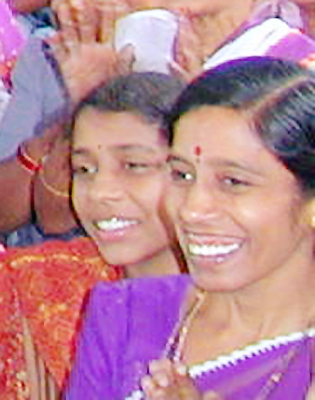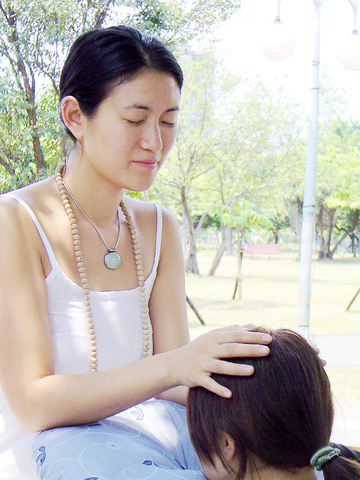When someone claims to be capable of transferring inner happiness and a connection to the universal oneness by just touching your head, a flood of skeptical questions may arise. Employing a technique they learned in India, practitioners of the Oneness Center in Taipei offered "deekshas," or positive energy transfers through touch, to promote inner joy in 30 people at the Cosmos Hotel yesterday.
New to Taiwan, the Oneness movement is established in more than 150 countries around the world, with a network of millions of practitioners. According to experts, factors contributing to the global success of spiritual movements include a new message that avoids any strict adherence to one religious doctrine and a community ready to receive it.
The Center's use of traditional practices such as yoga and meditation, together with simplified elements of Hindu philosophy, make it a suitable candidate for Taiwan's growing and tolerant religious marketplace. But while the new movement may be welcomed by open and curious minds, how far it develops here depends on its ability to overcome language and cultural barriers.

PHOTOS COURTESY OF LEIVEN HWANG
Sri Bhagavan, also referred to as the Sri Kalki (the 10th incarnation of Lord Vishnu of the Hindu pantheon of deities), established the Oneness movement in southern India in 1990. Deekshas were not officially offered to foreign nationals until January last year when the Oneness University was founded.
This event coincided with the transit of the planet Venus over the sun in June last year. The potential to receive positive energy through deeksha is said by Bhagavan to be at its most powerful for the next eight years -- due to this auspicious timing -- and courses on how to awaken inner joy in oneself and others are being offered in the hope of spreading global enlightenment.
Taiwan's religious environment is described as polytheistic, dominated by a combination of ancestor worship, Taoism, and elements of Buddhism, and it is common for deities of both major denominations to be worshiped at the same temple. Since the end of martial law in 1987, Taiwan has adopted an open-door policy on new religions.

A journal published by Chiu Hei-yuan (
"After the lifting of martial law the religion market opened up and suddenly people searched for religious answers to their psychological questions. Questions that resulted from a period of major societal change," he said.
After the initial surge of interest in new religious movements began to die off in the late 1990s, the next 10 years saw a shift in what people were looking for in a religion. No longer did they want long and complicated answers to their psychological questions -- now it was instant spirituality they required.
"Now people look for simple ways to get rid of their anxieties. It's like instant coffee or fast food, they want a quick fix. Even repackaged old traditions, if they're simplified with a few new elements, will be attractive to people," Chiu said.
"To be successful [in Taiwan] a group must have a charismatic leader with Mandarin ability and teachings that have some affiliation with local traditions. They need to offer something new but not too different from the local culture," he said.
"New spiritual groups can also be seen as somewhat like new businesses introducing novel products into a society," said Gordon Melton, professor and director at the Institute for the Study of American Religion in Santa Barbara, US. "This movement [Oneness] is basically a Kundalini yoga group of the kind that has been at home in the West for 30 years. (Kundalini yoga combines meditation, prayer, physical practices and breathing exercises to fuse individual and universal consciousness to create a divine union.) The Oneness is a new organization but there are already many practitioners of its major practice [Kundalini yoga] and a large number of adherents to its overall philosophy. Hence it has a ready-made community upon which to initially attach itself," he said.
Amira Loo and her partner Revato Wasmann underwent a 21-day intensive course at the Oneness University before bringing the art of deeksha to Taiwan, a decision based partially on Loo's ability to speak Mandarin. Loo was born and raised in Canada by a Taiwanese mother and a father who is from China. Their first visit was last spring when they began offering courses on how to prepare one's body to receive deeksha. The courses were a sort of testing of the waters before they returned to India for another period of training. They have returned to open their center in Sindian, Taipei County, offering weekend courses and deeksha gatherings.
Traditional practices such as acupuncture and "reiki" (healing massage) share a commonality with deeksha in that they all emphasize the healing of the spiritual and physical self, yet only reiki and acupuncture are used in traditional and Western medicine. Neurobiologists, however, have recently shown interest in deeksha, which focuses on the spiritual connection with the divine. A scientific explanation for the transmission of spiritual energy was explained by German neurologist Christian Opitz as the blocking of the parietal lobes that give humans their sense of orientation to produce a temporary feeling of expanded consciousness. In addition, the stimulation of the frontal lobes releases dopamine, the essential neurotransmitter that creates a feeling of bliss.
Like reiki massage, deeksha is a transmission of energy where one person acts as a channel for the healing energy to be transferred into another body. The session begins with meditation, to prepare the body. The channelers then recite a mantra that invites the energy into their bodies, and then they will approach the recipient. Placing their hands on the head of the recipient, they transmit the energy into the body, causing physical and emotional reactions such as shaking, crying or laughing. At a weekend course a person may undergo four or five deekshas, each successive one meant to increase in intensity.
Loo stressed that the degree to which a beneficiary will feel anything is dependent on their openness to the experience. I received deeksha and felt little more than minor hot and cold sensations on the head. Another recipient, however, had strong reactions from the procedure and broke into fits of laughter.
"We do not transfer enlightenment. We transfer an initiation into an enlightenment process. Even though some people have become enlightened within one or two energy transfers, most people enter into a process that could take a few weeks to a few months and up to a few years to become enlightened. But not more than a few years," Loo said.
Leiven Hwang (
"It has had a remarkable impact on my life, physically, emotionally and spiritually. It starts with self and then it extends to other aspects to your life. The main thing is that it is easier for me to connect to a higher sense or state of being. In pragmatic terms, I'm much happier now." He claimed his girlfriend had a similar reaction.
Although Oneness claims no single doctrine as truth there is a large impetus to spread the message of readily available enlightenment. "Everyone can live in a deep state of peace, love and happiness regardless of their background or belief or culture or religion. It's not through years of meditation, yoga or tai chi practice, it's through easy and simple transfers of positive energy ... I plan to stay in Taiwan until thousands of people have received the grace and the ability to pass it on to others," Loo said.
For more information on the Oneness Center in Taipei, consult their Web site at www.thewayofgrace.com or email thewayofgracetaiwan@yahoo.ca.

As we live longer, our risk of cognitive impairment is increasing. How can we delay the onset of symptoms? Do we have to give up every indulgence or can small changes make a difference? We asked neurologists for tips on how to keep our brains healthy for life. TAKE CARE OF YOUR HEALTH “All of the sensible things that apply to bodily health apply to brain health,” says Suzanne O’Sullivan, a consultant in neurology at the National Hospital for Neurology and Neurosurgery in London, and the author of The Age of Diagnosis. “When you’re 20, you can get away with absolute

When the South Vietnamese capital of Saigon fell to the North Vietnamese forces 50 years ago this week, it prompted a mass exodus of some 2 million people — hundreds of thousands fleeing perilously on small boats across open water to escape the communist regime. Many ultimately settled in Southern California’s Orange County in an area now known as “Little Saigon,” not far from Marine Corps Base Camp Pendleton, where the first refugees were airlifted upon reaching the US. The diaspora now also has significant populations in Virginia, Texas and Washington state, as well as in countries including France and Australia.

On April 17, Chinese Nationalist Party (KMT) Chairman Eric Chu (朱立倫) launched a bold campaign to revive and revitalize the KMT base by calling for an impromptu rally at the Taipei prosecutor’s offices to protest recent arrests of KMT recall campaigners over allegations of forgery and fraud involving signatures of dead voters. The protest had no time to apply for permits and was illegal, but that played into the sense of opposition grievance at alleged weaponization of the judiciary by the Democratic Progressive Party (DPP) to “annihilate” the opposition parties. Blamed for faltering recall campaigns and faced with a KMT chair

A police station in the historic sailors’ quarter of the Belgian port of Antwerp is surrounded by sex workers’ neon-lit red-light windows. The station in the Villa Tinto complex is a symbol of the push to make sex work safer in Belgium, which boasts some of Europe’s most liberal laws — although there are still widespread abuses and exploitation. Since December, Belgium’s sex workers can access legal protections and labor rights, such as paid leave, like any other profession. They welcome the changes. “I’m not a victim, I chose to work here and I like what I’m doing,” said Kiana, 32, as she